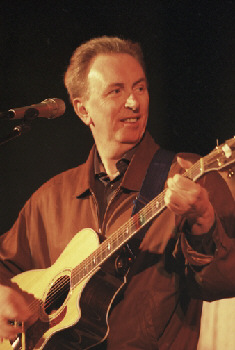
Al Stewart
Historically-minded singer-songwriter Al Stewart’s career violates his own “50-year rule,” in which he tries to avoid incorporating events less than a half-century in the past into his songs. “Until you have some distance, people get hysterical about overstatement. You have to put things in perspective.” But in the past few years, Stewart’s 40-year musical output (18 original albums, plus best-ofs) has been the subject of a boxed set (the 5-CD Just Yesterday), a large-scale US reissue program to meet the demand for his back catalogue, and Al’s 2002 biography, “The True Life Adventures of a Folk Rock Troubadour” by Neville Judd, has been reissued as an updated paperback. Oh yes, and Al still plays 70 or 80 shows yearly and has a splendid new CD, Sparks of Ancient Light, his second for Appleseed, following 2005’s acclaimed A Beach Full of Shells.
A California resident since the mid-’70s, Al Stewart was born in Glasgow, Scotland, in 1945 and moved with his family to Bournemouth, a seaside town in the south of England, at an early age. It was there that Al bought his first guitar – from future Police guitarist Andy Summers – and learned his first guitar licks from Robert Fripp, later the leader of King Crimson.
Leaving school at 16, Al began his musical resume as a guitarist for various local bands – “I wanted to be Al Beatle . . . I wanted to be Keith Richards” – before exposure to Bob Dylan’s songs shifted his focus from instrumentalist to vocalist and lyricist.
In 1965, Al moved to London, where he shared a flat with Paul Simon, and served as emcee at the famed Les Cousins folk club, fraternizing with rising young talents like Simon, Ralph McTell, and Cat Stevens. He was soon writing and performing his own songs at Les Cousins and other folk clubs and colleges across England, opening shows for groups such as Fairport Convention and Pentangle.
Following a 1966 single, “The Elf,” Al’s first album, Bedsitter Images, was released in the UK in 1967 (and years later in the US). Al’s follow-up, Love Chronicles, won him a measure of fame and infamy for its intimate tales of Al’s romantic life, including a 19-minute title song that, um, climaxed with the use of a then-shocking vulgarism for “fornicating.” The CD also featured exemplary musicianship by a pre-Led Zeppelin Jimmy Page and a pseudonymous Richard Thompson on lead guitars, plus other Fairporters.
A near-miss on an alternate career arc came in 1966 or ’67, when Al was introduced to experimental artist Yoko Ono at London’s psychedelic UFO Club; she was seeking financial backers for her film of people’s bottoms, as well as a guitarist to teach her to play. Al actually put up some cash for Yoko’s film, “but, better still, I had a tape recorder.” The friendship lasted for six or nine months, “until she met a more famous guitarist with a bigger tape recorder.” Need we say who?
After releasing several more albums written in autobiographical mode, Al shifted his lyrical gaze outward, into history, literature and current events. He debuted this approach on 1973’s Past, Present & Future, highlighted by “Nostradamus,” “Roads to Moscow” and one of Al’s personal favorites, “Old Admirals.” His next LP, Modern Times, cracked the US Top 40 charts in 1975 and led to a full-length US tour for Al and his band.
With groundwork laid and touring dues paid, Al’s next album exploded in American and elsewhere: Year of the Cat (1976) spun off two Top 20 hits (the indelible title song and “On the Border”) en route to becoming a million-selling release itself. Al’s next album, 1978’s Time Passages, repeated the success of its predecessor, selling a million copies and yielding the Top 10 title track and Top 30 single, “Song on the Radio.”
The rise of late ’70s punk rock, which was more about spitting on history than chronicling it, coincided with management and record label problems for Al, and his recorded output slowed. In the early ’90s, he returned to his folk roots with a solo tour of the UK and the release of Famous Last Words, utilizing acoustic instrument- ation and traditional folk and classical styles. Between the Wars (1995), which focused on the 1920s and ’30s, marked Al’s first collaboration with former Wings guitarist Laurence Juber; their next effort, Down in the Cellar (2000), was a concept album incorporating Al’s knowledge of fine wines into his you-are-there historical and personal narratives; the CD was only released in Europe at the time and led to a drought of new Stewart material finally broken by 2005’s A Beach Full of Shells on Appleseed, on which, noted the All Music Guide, “both his vocal style and craftsmanship remains intact,” while the Miami Herald concluded that “this venerable singer/songwriter is still doing what he does best, and clearly his best is as good as ever.”
Al Stewart’s “Gina in the Kings Road” from A Beach Full of Shells also appears on our various artists compilation, Sowing the Seeds – The 10th Anniversary, and sings harmony on "You Don't Know" on David Lewis's For Now.

|


